Article by Katy Orford, National Assembly for Wales Research Service
The Rural Development Plan (RDP) forms Pillar II of the Common Agricultural Policy (CAP). Under the regulations that govern the RDP for 2014-2020 Member States and Regions (including Wales) are required to develop a Plan by selecting different options from a set list of activities that should support agriculture, sustainable land management, rural businesses and rural communities.
The regulations that govern the development of RDPs require Member States and Regions to ensure that the range of activities they select contribute towards:
- the competitiveness of the rural economy (agriculture, forestry and rural Small and Medium sized Enterprises (SMEs)
- the sustainable management of natural resources and climate action
- balanced territorial development of rural areas.
2014 is a transition year for the RDP with the current RDPs (2007-2013) coming to an end and Member States and Regions developing their proposals for new RDPs to cover the next period. The new RDPs will become fully operational in January 2015. In the intervening period Member States and Regions must submit their RDPs to the European Commission for approval. The Minister for Natural Resources and Food, Alun Davies (the Minister), has indicated that he will be required to submit the first draft of the Wales RDP to the European Commission by May 2014.
In order to meet this deadline the Minister has announced that he will be launching a consultation on the new RDP for Wales on 13 February.
Prior to this the Welsh Government established a RDP Task and Finish Group chaired by Peter Davies, Sustainable Futures Commissioner to provide advice to the Minister on the content of the RDP and published a consultation on the overarching objectives and priorities that would govern the new RDP. This consultation entitled, the Rural Development Plan 2014-2020 Next Steps Consultation document, closed in April 2013. The feedback received from the consultation exercise was analysed and the full report summarising responses to the consultation was published by the Welsh Government in August 2013.
Although a detailed consultation on the new RDP is yet to be conducted the Minister has already made a number of announcements that will impact upon its contents. In announcing his decisions on how the Welsh Government will implement Pillar 1 of the CAP (direct payments to farmers) the Minister outlined that he would transfer 15 per cent of the Pillar 1 budget to Pillar 2. This is the maximum amount that Member States and Regions are allowed to transfer from Pillar 1 to Pillar 2. In announcing this decision the Minister stated:
My ambition for the Programme is to make the industry more resilient and competitive, equipping people with skills and knowledge; making targeted investments in farms and farm related businesses, safeguarding the natural environment whilst harnessing opportunities for green energy; and tackling poverty which goes largely unseen in rural Wales.
The Minister has also already issued a consultation on proposed changes to the Glastir scheme under the new RDP. Glastir is the Welsh Government’s agri-environment-climate scheme. All Member States and Regions are required to include an agri-environment-climate scheme within their RDP but are given discretion as to how the scheme is formed and run.
Details of the support that will be available for organic farming under the new RDP has also been announced in order to provide certainty to the sector. In a written statement on 6 February 2014 on Organic Farming support under the next Rural Development Plan 2014-20, the Minister stated that:
the Welsh Government will continue to recognize the benefits of organic farming and reimburse them through the Rural Development Plan (RDP)…Over 60% of organic farmers have either applied to join or are already participating in other parts of the Glastir scheme. I believe these farmers should be able to join the new stand alone Glastir Organic scheme while remaining eligible for also delivering the other environmental goods and services provided for elsewhere in Glastir and this will be the basis of the new scheme’s development.
Further information:
CAP Reform 2014-20: EU Agreement and implementation in the UK and in Ireland






